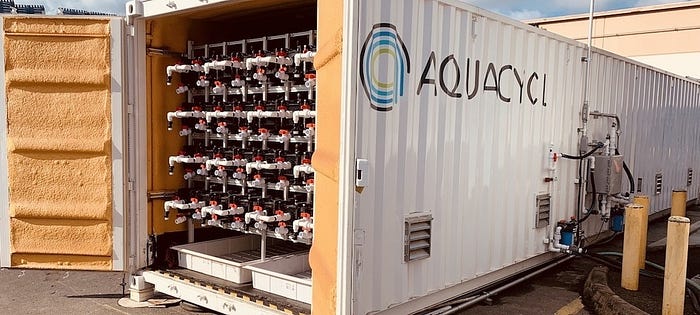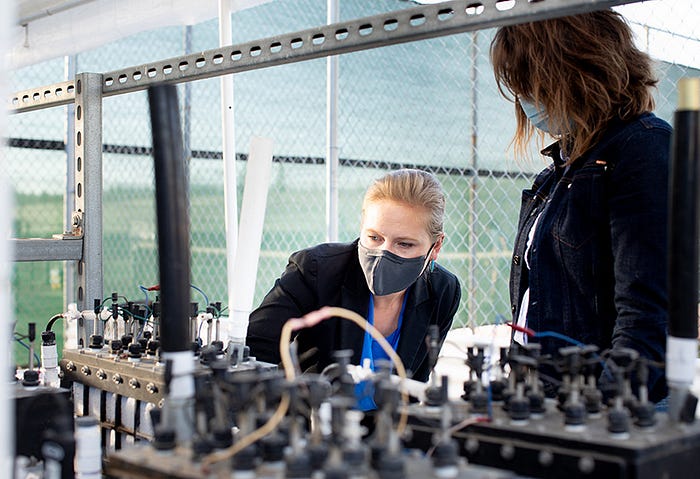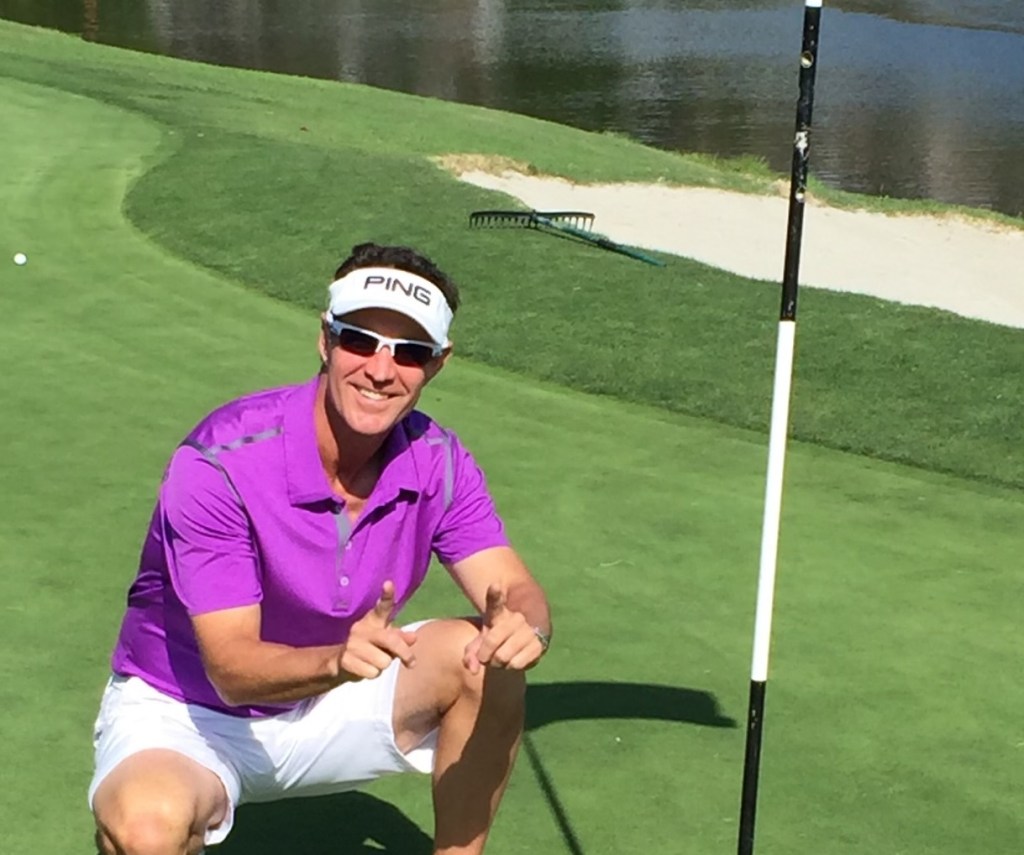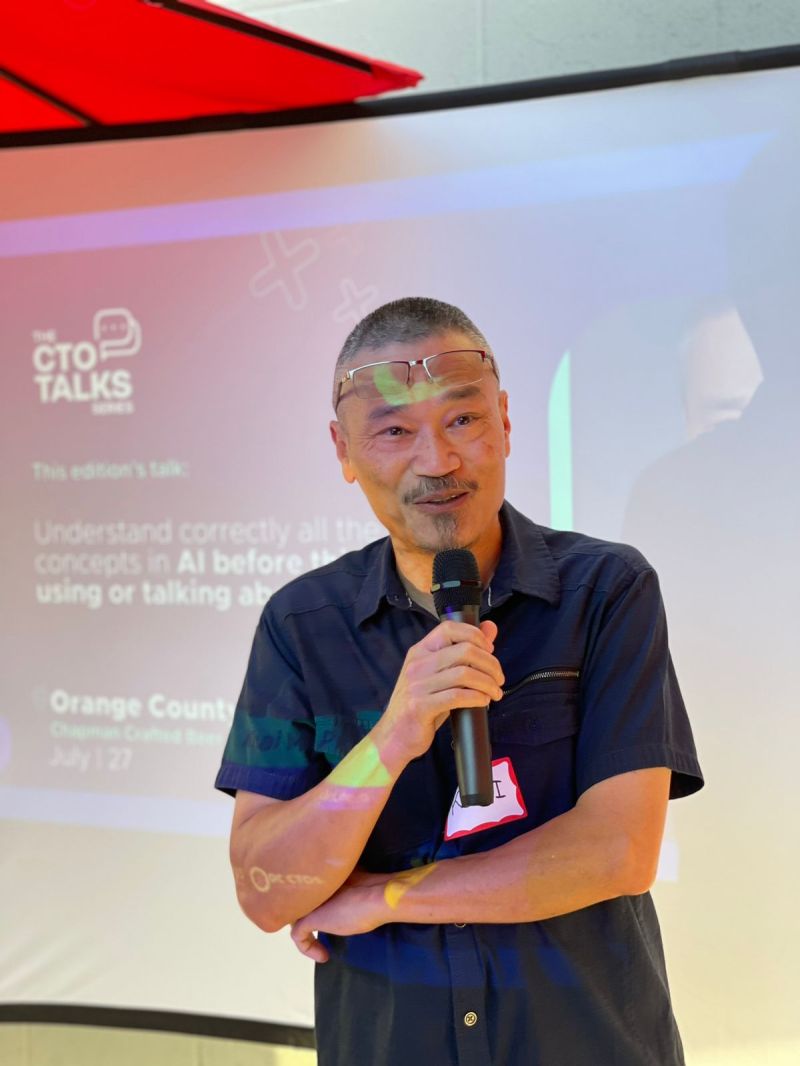Recently, I had the chance to sit down with Juli Iacuaniello, the Marketing Director at one of San Diego’s most cutting-edge startups, Aquacycl. Focused on providing modular, affordable wastewater treatment through an innovative modular, microbial fuel cell system that turns waste into electrical energy and clean water, this company is on the front lines of building resilience into our communities, society, and infrastructure.
In the interview below, we explore the ideas of building resilience into a company culture and what it took to navigate through COVID, Aquacycl’s biggest successes, the San Diego startup scene, the role wastewater treatment plays in water access and the climate, and the importance of creating a product that isn’t just environmentally sound, but economically sound as well.
If you’d like to see more about Aquacycl and their mission, you can check them out on LinkedIn or their website. You can also reach out to Juli personally if you’re interested in learning more!
I’m chiefly interested in the concept of resilience — personal, communal, and societal. What does resilience mean to you and how does it align with Aquacycl’s mission?
Our mission is to provide sanitation and clean water for people that don’t have it. There are over two billion people in the world that have no access to sanitation that is safe and reliable — more people have access to a cell phone than a toilet! When Aquacycl was started, the mission was to address this sanitation and clean water gap.
In the global south especially, a lot of people don’t have the infrastructure for sanitation or clean water. Where we want to be in three, five, or seven years is to be able to provide modular, rapidly deployable mobile or permanent systems for sanitation. People that are displaced from natural disasters are oftentimes put into horrible situations, into refugee camps where they don’t really have the amenities that you or I would think of on a daily basis. Being able to rapidly deploy modular systems that can address that gap is one opportunity to build resilience in the face of disaster in areas that need it the most.
We were founded with a goal of off-grid and off-energy sanitation. Eventually (and I say eventually because we aren’t quite there yet) that’s where we want to be. We aren’t rebuilding the old centralized model. We aren’t just replacing the old systems with how they were build 50 years ago. We are actually coming in with new technology that can address the problems in front of us without adding to the problem, without requiring additional infrastructure, and without requiring huge capital investment to build out the new infrastructure. We can build this new technology and infrastructure in a way that can reduce the impact of natural disasters and the sanitation gap, and build resilience in communities that are most vulnerable to natural disasters around the world.

Startups are notoriously vulnerable to risk. Can you talk about some of the obstacles that you have overcome thus far? How have you worked to build resilience within your company culture to continue to identify, as well as overcome, potential setbacks?
I’d say the number one obstacle was COVID. I had joined maybe six months before COVID hit, and everything started shutting down. Schools shut down, businesses were closing — that was a really challenging time for AquaCycl. We were in the middle of raising money! We were trying to get customers and we were calling on companies that also basically stopped everything.
Our CEO and founder, Orianna Bretschger, is tremendous. She responded very quickly to try to keep the company alive. During that time, Aquacycl pivoted a little bit, since we now had excess capacity — we used our lab space to make hand sanitizer and get it to first responders. And the several of us who had been furloughed while trying to understand what was happening believed so strongly in the mission and vision of the company that we actually kept working to try and bring it to fruition!
But other than that, since there was a couple of us on the sales and marketing team that were still working through the shutdown, we actually ended up closing our first commercial contract.
I think that the reasons we were able to pull through the COVID shutdown were because we believed so much in both the mission of the company and the value of the technology — both its industrial value and the long term value.
Over the last couple years, we’ve closed our Series A and used this money to prepare for the next phase of growth. We are moving from startup to scaleup, so we have brought in new team members who can put in place the processes that will allow us to grow — but we’re making sure that we still have a culture of putting the customer first and getting things done quickly.
Would you say that part of what helped Aquacycl get through the COVID pandemic was a hyper focus on the company’s vision and mission statement?
Yes, absolutely.
I think the people who work at Aquacycl are excited to be here because of the vision and because of the game changing technology we are building. This is cool technology where you take, these little batteries, basically, and the microbes are both cleaning the water and producing electricity. I think people here really are excited about the technology, and they’re excited about the mission.
I’d also say people like working here because, while it’s a small team still, it still has great comradery. We really haven’t had much turnover at all. There have been a couple people that came in and out, but for the most part, our team has stayed pretty consistent.
So I think it comes down to the mission, the technology, and the people who are here. We’re really careful about hiring the right people, and hiring for fit rather than necessarily hiring the absolute most qualified. Our CEO is extremely careful about hiring for cultural fit within our company.
https://cdn.embedly.com/widgets/media.html?src=https%3A%2F%2Fwww.youtube.com%2Fembed%2FIxsG8G0YTEE%3Ffeature%3Doembed&display_name=YouTube&url=https%3A%2F%2Fwww.youtube.com%2Fwatch%3Fv%3DIxsG8G0YTEE&image=https%3A%2F%2Fi.ytimg.com%2Fvi%2FIxsG8G0YTEE%2Fhqdefault.jpg&key=a19fcc184b9711e1b4764040d3dc5c07&type=text%2Fhtml&schema=youtubeTake a deeper look into Aquacycl’s technology with this video!
Can you talk about your biggest success that you’ve had with Aquacycl thus far? What helped you achieve it?
There have been several significant achievements for us! From a commercial standpoint, one of our biggest successes has been our partnership with PepsiCo, where we are working at their site to treat wastewater from their process. They have been a tremendous partner for us. After an initial pilot, we expanded to a multi-year commercial contract, with clear KPIs that track system performance, environmental impact and cost savings. Another big success for us last year was expanding into new industries, notably hydrocarbon remediation, where we validated that we can remove really challenging compounds.
I’d say another success is the recognition that we’ve received from various awards and media, which has increased the visibility of what we are trying to achieve. Some of these included our CEO receiving the Cartier Women’s Initiative Laureate in STEM, Impact Company of the Year by Startup San Diego, a nominee for Fast Company Next Big Things in Tech, and many others. We have also received coverage in Forbes and Fast Company, and various trade and business journals. These successes are a testament to our progress as a small company and provide the validation and social proof that our product is excellent, as well as customer satisfaction validation.
We’ve had amazing support over the past few years that has helped us to grow the company to where it is. We’ve participated in a number of accelerators, including Imagine H20, Xylem Innovation Labs, Google for Startups, 100+ Accelerator (sponsored by AB InBev, The Coca Cola Company, Unilever and Colgate-Palmolive), Unreasonable Impact, Creative Destruction Lab, Plug and Play, and The Circulars. These have been key to our successes, as they help connect us with investors, customers and potential channel partners.
San Diego is well regarded for our burgeoning biotech scene. Does being part of such a community help as you work to grow your company and innovate in your own space? Have there been any surprising drawbacks?
No, it’s a good question, but I think that Orianna (our CEO) could probably provide a more detailed response. From my perspective, however, the San Diego community has been incredibly supportive of Aquacycl. I first met Orianna about four years ago at a pitch event organized by Hera Labs, which is now known as Stella. They do a lot to support female entrepreneurs. Orianna won the pitch contest, and went on to win the San Diego Angel Conference, where Aquacycl was the first company to secure seed money and visibility.
The San Diego startup community, although not exclusively focused on biotech, has been a tremendous support to us. We are a biotech company, but we are not a traditional one. Nonetheless, the community has shown a strong desire to help startups grow by providing connections and inviting us to events. Overall, I cannot speak highly enough of the startup community in San Diego that has supported us!

Global water use is suspected to grow between 20–50% in 2050. Can you talk about Aquacycl’s role in helping mitigate the risk that dwindling water access poses to our communities?
The big issue in the West is water scarcity, and I believe our solution has the potential to address this challenge. By treating water at the source, we can enable water reuse and reduce the amount of blue water required, which in turn alleviates water scarcity for everyone. Industrial companies are heavy water consumers, so reducing their water footprint can have a significant impact. For instance, clean water can be reused for non-product contact applications such as washing floors, toilets, and tanks. This approach reduces the need for freshwater while addressing concerns around food safety.
Water scarcity is a significant driver for us, and it underscores the need for resilience in ensuring that water is available for everyone. We must prioritize water availability to avoid situations where people are forced to relocate because of water shortages. While small actions such as turning off the tap while brushing teeth can help, large-scale water conservation efforts by companies can make a significant difference.
Looking to the future, what do you see as the future for Aquacycl? Are there any specific opportunities and risks that you are looking to navigate in the future, both near and long term?
In the near future, our focus will remain on expanding our industrial customer base since we believe that’s where we have the strongest value proposition. However, our long-term goal is to return to sanitation and distributed sanitation, and we’re actively working towards that end. The challenge that our customers face is that while they have funds allocated for their operations, waste management is a necessary expense. The real challenge lies in meeting their aggressive sustainability goals related to water and climate, which requires reducing greenhouse gas emissions.
Our aim in the next two to three years is to achieve a stronger penetration rate and quantify our contribution to improving water quality. Currently, a vast amount of wastewater, ranging from 56% to 80%, depending on the source, is discharged untreated into the environment. This is a significant environmental problem since the wastewater sector is already responsible for 4 to 5% of global greenhouse gas emissions. Our goal is to address this issue and make a tangible impact by expanding our reach.
We’re also looking to expand into the European market, replicating our North American success. We see many opportunities in multiple verticals and waste streams, including pharmaceutical and hydrocarbon wastewater.
Finally, technology plays a crucial role in our growth plan. Our CTO (who actually just walked by!) has a roadmap for the development of our technology, and we’re working hard to make it a reality.
Aquacycl’s value proposition seems to be that not only is it greener and more efficient, it saves companies money. Can you talk about the importance of not only creating environmental resilience, but economic resilience as well?
That’s a really insightful question — all too often we focus solely on the environmental benefits of a particular initiative, and fail to take into account the economic factors that drive businesses. Ultimately, our clients are in the business of generating profits for their shareholders, which is the fundamental principle on which our society is built. In our numerous conversations with various companies, we have found that unless an initiative can deliver both economic and environmental benefits, it cannot be effectively marketed on the basis of environmental benefits alone. While there may be some niche areas and technologies where the environmental benefit alone can drive sales, for the most part, companies require a solution that delivers operational savings as well as sustainability benefits.
This approach is driven by the fact that if an initiative costs a company a significant amount of money without delivering a commensurate return, it will be viewed unfavorably by investors. In the consumer packaged goods (CPG) industry, which is known for its competitiveness, margins are crucial. If the margins start to slip, investors will take note, and this could have serious consequences for the company’s long-term viability. Therefore, any sustainability initiative must deliver a dual benefit in order to make sense from a business perspective and ensure the longevity of the company.
Want to learn more? Go more in depth here:




Leave a comment